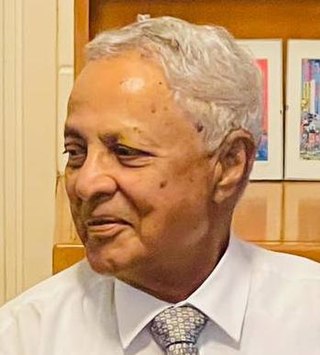
Mahendra Pal Chaudhry is a Fijian politician and the leader of the Fiji Labour Party. Following a historic election in which he defeated the long-time former leader, Sitiveni Rabuka, the former trade union leader became Fiji's first Indo-Fijian Prime Minister on 19 May 1999, but exactly one year later, on 19 May 2000 he and most of his Cabinet were taken hostage by coup leader George Speight, in the Fiji coup of 2000. Unable to exercise his duties, he and his ministers were sacked by President Ratu Sir Kamisese Mara on 27 May; Mara intended to assume emergency powers himself but was himself deposed by the military leader, Commodore Frank Bainimarama.
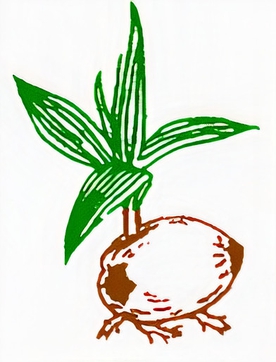
The Fiji Labour Party, also known as Fiji Labour, is a political party in Fiji. Most of its support is from the Indo-Fijian community, although it is officially multiracial and its first leader was an indigenous Fijian, Dr. Timoci Bavadra. The party has been elected to power twice, with Timoci Bavadra and Mahendra Chaudhry becoming prime minister in 1987 and 1999 respectively. On both occasions, the resulting government was rapidly overthrown by a coup.

The United Fiji Party was a political party in Fiji. It was founded in 2001 by Prime Minister Laisenia Qarase as a power base; it absorbed most of the Christian Democratic Alliance and other conservative groups, and its endorsement by the Great Council of Chiefs (Bose Levu Vakaturaga) caused it to be widely seen as the successor to the Alliance Party, the former ruling party that had dominated Fijian politics from the 1960s to the 1980s. It drew its support mainly from indigenous Fijiians.

Tupeni Lebaivalu Baba is a Fijian academic, politician, and former Cabinet Minister. A founding member of the Fiji Labour Party, he served as a Cabinet Minister in the government of Timoci Bavadra until removed from office by the 1987 Fijian coups d'état, and then as Deputy Prime Minister of Fiji in the government of Mahendra Chaudhry until removed from office by the 2000 Fijian coup d'état. After splitting with Choudhry in the wake of the coup, he founded the New Labour Unity Party to contest the 2001 election, but failed to win a seat in Parliament. He unsuccessfully attempting to re-enter politics at the 2006 election under the banner of the Soqosoqo Duavata ni Lewenivanua, and again at the 2014 election as part of the Social Democratic Liberal Party.
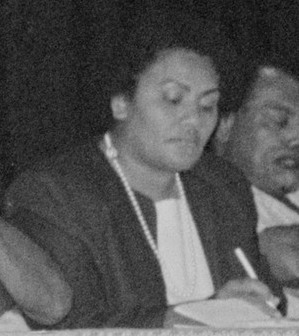
Adi Kuini Teimumu Vuikaba Speed was a Fijian chief and politician, who served as Deputy Prime Minister in 1999 and 2000.

General elections were held in Fiji between 8 and 15 May 1999. They were the first election held under the revised Constitution of 1997, which instituted a new electoral system and resulted in Mahendra Chaudhry taking office as Fiji's first Indo-Fijian Prime Minister.

General elections were held in Fiji in August and September 2001. The Soqosoqo Duavata ni Lewenivanua party won 18 of the 23 seats reserved for ethnic Fijians and one of three "general electorates" set aside for Fiji's European, Chinese, and other minorities. It also won 13 of the 25 "open electorates," so-called because they are open to candidates of any race and are elected by universal suffrage. The remaining five ethnic Fijian seats, and one open electorate, were won by the Conservative Alliance, one of whom was George Speight who had led the putsch against the lawful government the year before. Chaudhry's Labour Party won all 19 Indo-Fijian seats and eight open electorates. The New Labour Unity Party, formed by defectors from the FLP, won one general electorate and one open electorate. The three remaining seats were won by minor parties and independent candidates.
Ratu Tevita Momoedonu was a Fijian politician who served as the fifth Prime Minister of Fiji twice – each time extremely briefly. Both appointments were to get around constitutional technicalities; his first term of office – on 27 May 2000 lasted only a few minutes. His second term – from 14 to 16 March 2001 was for two days. He subsequently served his country as Ambassador of Fiji to Japan. Using his chiefly title of "Taukei Sawaieke", he later led pushed for the Yasana of Ba to secede from the Burebasaga and Kubuna Confederacies to form their own fourth confederacy under the Tui Vuda, Ratu Josefa Iloilo, who died in 2011.

The Conservative Alliance was a right-wing political party in Fiji, and a member of the ruling coalition government. It was commonly known as the CAMV, a combination of the initials of its English and Fijian names. At its annual general meeting on 17 February 2006, the party voted to dissolve itself and merge with its coalition partner, the Soqosoqo Duavata ni Lewenivanua (SDL). The President of the party at the time of its dissolution was Ratu Tanoa Cakobau, a Bauan chief, while Ratu Josefa Dimuri served as General Secretary. For legal reasons, Parliamentary members of the disbanded party maintained a separate caucus in the House of Representatives, under the leadership of Ratu Naiqama Lalabalavu, until the end of the parliamentary term, on 27 March 2006.

The Fijian Association Party (FAP) is a former political party in Fiji. It played a significant role in Fijian politics throughout the 1990s, but lost all of its seats in the House of Representatives in the parliamentary election of 2001.

The Christian Democratic Alliance, better known locally by its Fijian name, Veitokani ni Lewenivanua Vakarisito (VLV), was a Fijian political party that operated in the late 1990s and early 2000s.
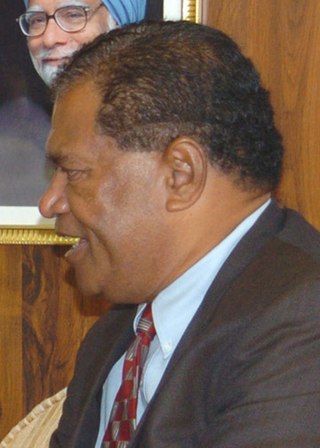
Poseci Waqalevu Bune is a former Fijian civil servant, diplomat, politician and Cabinet Minister. He has served as chair of the Public Service Commissioner, secretary to the Prime Minister, and as Fiji's permanent representative to the United Nations, as well as a Cabinet Minister in the governments of Mahendra Chaudhry and Laisenia Qarase, and in the military regime of Frank Bainimarama.

The Bai Kei Viti, was a political party in Fiji.

Rose Lavenia Bernadette Rounds Ganilau, born July 5, 1951 as Lavenia Bernadette Rounds, is a Fijian writer, broadcaster, and politician, who served as Minister for Labour, Minister for Tourism, Industrial Relations, Productivity and Environment in the interim Cabinet of Commodore Frank Bainimarama, having been appointed on 9 January 2007. In previous political roles, she served in 2000 and 2001 in the Interim Government of Prime Minister Laisenia Qarase as Assistant Minister for Social Welfare, and from June to December 2006, she was Deputy Leader of the Opposition and Chairperson of the Public Accounts Committee of the House of Representatives, until the military coup of 5 December.
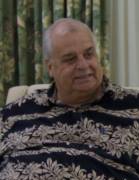
Mick Malcolm Millis Beddoes, widely known as Mick Beddoes, is a Fijian politician and businessman from Nadi, who led the United Peoples Party from 2000 to 2013, and was the Leader of the Opposition at the time of the military coup of 5 December 2006. He was also the Chief Executive of the World Netball Company, and was Chairman of the organising committee for the 2007 World Netball Championships, but announced his resignation on 24 January 2006, citing a possible conflict of interest, as his company would be working as a ground operator during the championships.
Ofakilomaloma Swann, also known as Ofa Duncan, is a Fijian lawyer, academic, and former politician. She served in the House of Representatives of Fiji from 1999 to 2006, and was leader of the New Labour Unity Party.
Kenneth Vincent Zinck is a Fijian politician, who served in the Cabinet from 2001 to 2006 as Minister for Labour, Industrial Relations, and Productivity.

General elections were held in Fiji between 6 and 13 May 2006.

The Party of National Unity was a Fijian political party founded by Ratu Sairusi Nagagavoka in 1998; by the time of the military coup of 2006, Nagagavoka remained the President of the party. A well-known member of the party was Apisai Tora. Presenting itself as a multiracial party representing the interests of Ba Province in particular, it formed part of the Fiji Labour Party-led People's Coalition in the general election of 1999, and won four seats in the House of Representatives. It lost all of its seats in the following election, in 2001, but party stalwart Ponipate Lesavua was appointed to the Senate as one of 8 nominees of Opposition Leader Mahendra Chaudhry.









